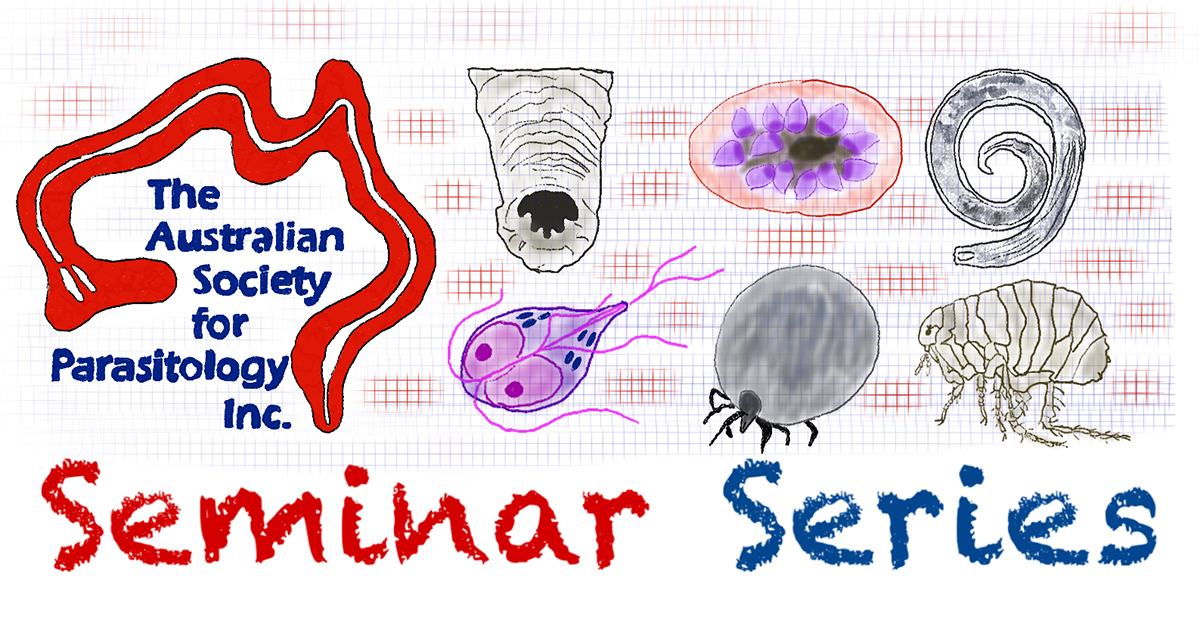Join our online ASP Seminar Series with Siobhon Egan from Murdoch University, speaking speaking on “What’s in the wildlife? Surveillance of ticks and their associated microbes in Australian wildlife.” and Bonnie Derne, from Flinders University, speaking on “Of parasites and pygmy bluetongues: An investigation of parasite and gut microbiota dynamics following a wildlife translocation.” with co-chairs Amanda Duarte Barbosa and Stuart Ralph. Our seminar will take place online via Zoom on Friday 26th March 2021 at 1pm AEDT.
Please register online using this link for your unique passcode to join the seminar.
Siobhon Egan recently completed her PhD at Murdoch University with the Vector and Water-borne Pathogen Resource group and has recently taken up the position of Postdoctoral research fellow at the Centre for Computational and Systems Medicine, Australian National Phenome Centre at Murdoch University. Siobhon’s PhD research focused on understanding the epidemiology of ticks and associated microbes in their vertebrate hosts. Utilising a multidisciplinary approach her project aimed to (i) characterise ticks parasitizing our native wildlife; and ii) investigate bacteria and haemoprotozoa present to provide insight into the dynamics between host-microbe-tick. Siobhon will be discussing ticks and their associated microbes in Australian wildlife during her seminar. Siobhon says “Ticks (Ixodida) represent one of the most important vector groups affecting human and animal health, and in recent years there have been increasing concerns regarding the cause of tick-borne disease affecting Australians. Recent research has identified Australian ticks harbour a unique diversity of microbes however little is known about their sylvatic lifecycle with respect to vertebrate hosts. This study aimed to characterise the diversity of tick-associated microbes present in over 550 samples from 203 wildlife hosts. The bacterial and haemoprotozoan diversity from blood, tick and tissue samples was characterised using a combination of amplicon next generation sequencing, targeted Sanger sequencing, and microscopy. A diverse range of tick associated bacteria was identified, such as Anaplasmataceae, Bartonellaceae, Borreliaceae, Coxiellaceae, Midichloriaceae. Statistical analysis using constrained ordination methods showed blood, tick and tissues had distinct community signatures and was generally different between host species. In addition, eight species of haemoprotozoa were identified, including species within the genera Babesia, Hepatozoon, Theileria and Trypanosoma. This study further confirmed the absence of northern hemisphere tick-borne pathogens and provided further evidence of the unique microbes present in Australian wildlife and ticks.”
Bonnie Derne recently completed her PhD at Flinders University and has an interest in the role parasites play in wildlife populations, particularly during conservation management. She will talk about her PhD work which involved an experimental translocation of the endangered pygmy bluetongue lizard. She genotyped nematode, mite and gut microbiota prior to and over time following the translocation to comment on how mixing hosts from different populations affected parasite dynamics, with implications for future management of this lizard species.
Our awesome event image was created by the very talented parasitologist and artist Thorey Jonsdottir from the Burnet Institute.








